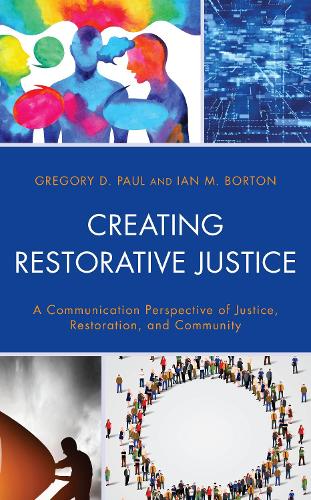
Creating Restorative Justice: A Communication Perspective of Justice, Restoration, and Community
(Hardback)
Publishing Details
Creating Restorative Justice: A Communication Perspective of Justice, Restoration, and Community
By (Author) Gregory D. Paul
By (author) Ian M. Borton
Bloomsbury Publishing PLC
Lexington Books
7th April 2021
United States
Classifications
Professional and Scholarly
Non Fiction
Penology and punishment
Sociology
364.68
Physical Properties
Hardback
128
Width 163mm, Height 229mm, Spine 17mm
381g
Description
Discussion of the histories, meanings, and assumptions of restorative justice have enriched the development of its theory, research, and practices. While some of this work has addressed the role of communication, the treatment of communication within restorative justice remains rather under-developed. Communication plays a central role in processes of restoration and justice and a constitutive role in making restorative justice what it is. In Creating Restorative Justice: A Communication Perspective of Justice, Restoration, and Community, Gregory D. Paul and Ian M. Borton argue that by centering communication in restorative justice as it occurs in various contexts (from families, to schools, to communities), we can simultaneously deepen our understanding, enrich our practice, and amplify our study of restoration and justice. From a communication perspective, restorative contexts both use and are created by the communication present. Any outcomes from restorative processes are thus the product of the communication both within and between restorative practices participants. As the world addresses the challenges presented by injustice, inequality, and insecurity, it is incumbent we expand our understanding of restorative processes to account for the vital role of communication.
Reviews
"At a time when our country is poignantly feeling the limitations of traditional approaches to justice, Creating Restorative Justice is a much-needed volume. Restorative justice, which emphasizes the harm that is inflicted on all parties when criminal or social violations occur, focuses on relationships that can transform perpetrators, victims, and society as a whole. The book centers communication to illuminate not only how restorative justice happens, but how social conversations about justice create its very existence. It is my fervent hope that this book is widely read and inspires continued understanding, practice, and research of restorative justice."
-- Jessica JamesonAuthor Bio
Gregory D. Paul is professor and head of the department of communication studies at Kansas State University.
Ian M. Borton is professor of communication at Aquinas College.
